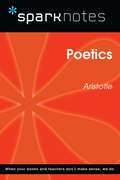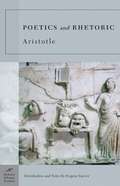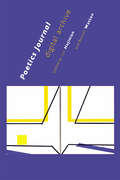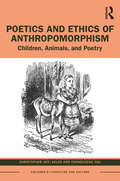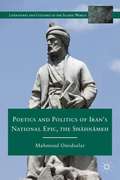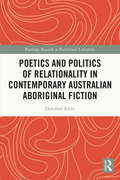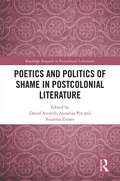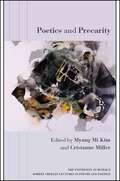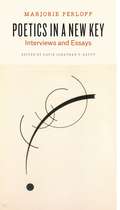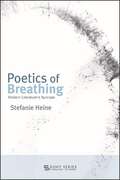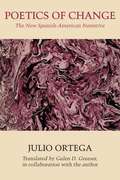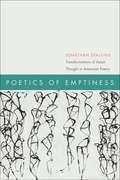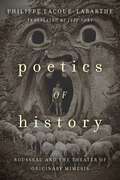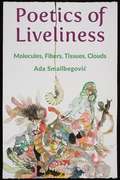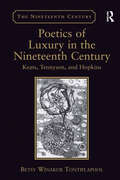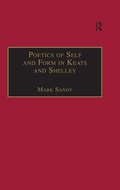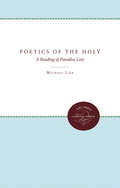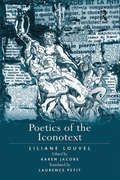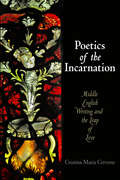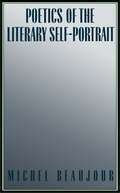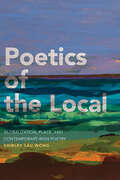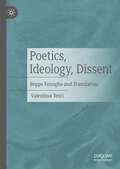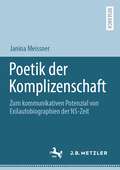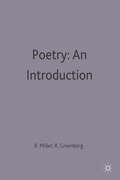- Table View
- List View
Poetics (SparkNotes Philosophy Guide)
by SparkNotesPoetics (SparkNotes Philosophy Guide) Making the reading experience fun! SparkNotes Philosophy Guides are one-stop guides to the great works of philosophy–masterpieces that stand at the foundations of Western thought. Inside each Philosophy Guide you&’ll find insightful overviews of great philosophical works of the Western world.
Poetics And Rhetoric (Barnes And Noble Classics)
by Aristotle S. H. Butcher George Stade Eugene Garver W. Rhys RobertsPoetics and Rhetoric, by Aristotle, is part of the Barnes & Noble Classics series, which offers quality editions at affordable prices to the student and the general reader, including new scholarship, thoughtful design, and pages of carefully crafted extras. <P><P> Here are some of the remarkable features of Barnes & Noble Classics: New introductions commissioned from today's top writers and scholars Biographies of the authors Chronologies of contemporary historical, biographical, and cultural events Footnotes and endnotes Selective discussions of imitations, parodies, poems, books, plays, paintings, operas, statuary, and films inspired by the work Comments by other famous authors Study questions to challenge the reader's viewpoints and expectations Bibliographies for further reading Indices & Glossaries, when appropriate All editions are beautifully designed and are printed to superior specifications; some include illustrations of historical interest. Barnes & Noble Classics pulls together a constellation of influences--biographical, historical, and literary--to enrich each reader's understanding of these enduring works. <P><P> It is no exaggeration to say that all Western literary criticism flows from Aristotle. In the Poetics he focuses mainly on drama, especially tragedy, and introduces ideas that are still being debated more than two thousand years later. Among them is the often misunderstood theory of the unities of action, place, and time, as well as such concepts as: art as a form of imitation, and drama as an imitation of human actions; plot as a drama’s central element, and "reversal” and "recognition” as important elements within a plot; and the purging of pity and fear from the audience as the function of tragedy. Rather than offer these ideas merely as abstract theories, Aristotle applies them in cogent analyses of the classic Greek dramas--the tragedies of Aeschylus, Sophocles, and Euripides. <P><P> In the Rhetoric, Aristotle turns to the principles of persuasive writing, including argumentation and the logical development of proof, appeals to emotion, and matters of delivery and style. Perhaps most essentially, Aristotle teaches us how to engage in the central civic activities of accusing and defending, recommending policies, and proving and refuting ideas. <P><P> These two foundational works are key documents for understanding the culture and politics of Western civilization, and how they continue to evolve today. <P><P> Eugene Garver is Regents Professor of Philosophy at Saint John’s University, Collegeville, Minnesota. He is the author of Machiavelli and the History of Prudence, Aristotle’s Rhetoric: An Art of Character, For the Sake of Argument: Practical Reasoning, Character, and the Ethics of Belief, and the forthcoming Living with Thought: A Confrontation with Aristotle’s Ethics.
Poetics Journal Digital Archive
by Lyn Hejinian Barrett WattenThe highly influential Poetics Journal, whose ten issues were published between 1982 and 1998, contributed to the surge of interest in the practice of poetics. Edited by internationally recognized poet/critics Lyn Hejinian and Barrett Watten, the journal presents major conversations and debates, and invites readers to expand on the critical and creative engagements they represent. This archive re-presents virtually all the articles originally published in Poetics Journal, organized alphabetically by author and in searchable form. It features indexes by contributors, keywords, and volume.The writing that appeared in Poetics Journal reflects the development of a range of creative and critical approaches in avant-garde poetry and art over two decades. In making this content newly available, the editors hope to preserve the generative enthusiasm for innovative writing and art it represents, while encouraging new uses and contexts.A Guide to Poetics Journal is also available, see http://www.upne.com/0819571205.html for more information.
Poetics and Ethics of Anthropomorphism: Children, Animals, and Poetry (Children's Literature and Culture)
by Christopher Kelen Jo You ChengchengPoetics and Ethics of Anthropomorphism: Children, Animals, and Poetry investigates a kind of poetry written mainly by adults for children. Many genres, including the picture book, are considered in asking for what purposes ‘animal poetry’ is composed and what function it serves. Critically contextualising anthropomorphism in traditional and contemporary poetic and theoretical discourses, these pages explore the representation of animals through anthropomorphism, anthropocentrism, and through affective responses to other-than-human others. Zoomorphism – the routine flipside of anthropomorphism – is crucially involved in the critical unmasking of the taken-for-granted textual strategies dealt with here. With a focus on the ethics entailed in poetic relations between children and animals, and between humans and nonhumans, this book asks important questions about the Anthropocene future and the role in it of literature intended for children. Poetics and Ethics of Anthropomorphism: Children, Animals, and Poetry is a vital resource for students and for scholars in children’s literature.
Poetics and Politics of Iran’s National Epic, the Shāhnāmeh
by Mahmoud OmidsalarThis book considers some of the Western interpretations of The Shahnameh - Iran's national epic, and argues that these interpretations are not only methodologically flawed, but are also more revealing of Western concerns and anxieties about Iran than they are about the Shahnameh.
Poetics and Politics of Relationality in Contemporary Australian Aboriginal Fiction (Routledge Research in Postcolonial Literatures)
by Dorothee KleinPoetics and Politics of Relationality in Contemporary Australian Aboriginal Fiction is the first sustained study of the formal particularities of works by Bruce Pascoe, Kim Scott, Tara June Winch, and Alexis Wright. Drawing on a rich theoretical framework that includes approaches to relationality by Aboriginal thinkers, Edouard Glissant, and Jean-Luc Nancy, and recent work in New Formalism and narrative theory, it illustrates how they use a broad range of narrative techniques to mediate, negotiate, and temporarily create networks of relations that interlink all elements of the universe. Through this focus on relationality, Aboriginal writing gains both local and global significance. Locally, these narratives assert Indigenous sovereignty by staging an unbroken interrelatedness of people and their Land. Globally, they intervene into current discourses about humanity’s relationship with the natural environment, urging readers to acknowledge our interrelatedness with and dependence on the land that sustains us.
Poetics and Politics of Shame in Postcolonial Literature (Routledge Research in Postcolonial Literatures)
by David Attwell Annalisa Pes Susanna ZinatoPoetics and Politics of Shame in Postcolonial Literature provides a new and wide-ranging appraisal of shame in colonial and postcolonial literature in English. Bringing together young and established voices in postcolonial studies, these essays tackle shame and racism, shame and agency, shame and ethical recognition, the problem of shamelessness, the shame of willed forgetfulness. Linked by a common thread of reflections on shame and literary writing, the essays consider specifically whether the aesthetic and ethical capacities of literature enable a measure of stability or recuperation in the presence of shame’s destructive potential. The obscenity of the in-human, both in the colonial setting and in aftermaths that show little sign of abating, entails the acute significance of shame as a subject for continuing and urgent critical attention.
Poetics and Precarity (The University at Buffalo Robert Creeley Lectures in Poetry and Poetics)
by Myung Mi Kim; Cristanne MillerAt a time when wars, acts of terrorism, and ecological degradation have intensified and isolationism, misogyny, and ethnic divisiveness have been given distinctively more powerful voice in public discourse, language itself often seems to have failed. The poets and critics in this book argue that language has the potential to address this increasing level of discord and precarity, and they negotiate ways to understand poetics, or the role of the poetic, in relation to language, the body politic, the human body, breath, the bodies of the natural environment, and the body of form.Poetry makes urgent issues audible and poetics helps to theorize those issues into critical consciousness. Poetry also functions as a cry to protest late capitalist imperialism, misogyny, racism, climate change, and all the debilitating conditions of everyday life. Hubs of concern merge and diverge; precarity takes differently gendered, historied, embodied, geopolitical manifestations. The contributors articulate a poetics that renders what has not yet been crystallized as discourse into fields of force. They also acknowledge the beauties of sound, poetry, and music, and celebrate the power of community, marking the surge of energy that can occur at a particular place at a particular moment. Ultimately, Poetics and Precarity fosters further conversations that will imagine the concerns of poetics as a continuously emerging field.
Poetics in a New Key: Interviews and Essays
by Marjorie PerloffMarjorie Perloff writes in her preface to Poetics in a New Key that when she learned David Jonathan Y. Bayot wanted to publish a collection of her interviews and essays, she was “at once honored and mystified.” But to Perloff’s surprise and her readers’ delight, the resulting assembly not only presents an accessible and provocative introduction to Perloff’s critical thought, but also highlights the wide range of her interests, and the energetic reassessments and new takes that have marked her academic career. The fourteen interviews in Poetics in a New Key—conducted by scholars, poets, and critics from the United States, Denmark, Norway, France, and Poland, including Charles Bernstein, Hélène Aji, and Peter Nicholls—cover a broad spectrum of topics in the study of poetry: its nature as a literary genre, its current state, and its relationship to art, politics, language, theory, and technology. Also featured in the collection are three pieces by Perloff herself: an academic memoir, an exploration of poetry pedagogy, and an essay on twenty-first-century intellectuals. But across all the interviews and essays, Perloff’s distinctive personality and approach to reading and talking resound, making this new collection an inspiring resource for scholars both of poetry and writing.
Poetics of Breathing: Modern Literature's Syncope (SUNY series, Literature . . . in Theory)
by Stefanie HeineBreathing and its rhythms—liminal, syncopal, and usually inconspicuous—have become a core poetic compositional principle in modern literature. Examining moments when breath's punctuations, cessations, inhalations, or exhalations operate at the limits of meaningful speech, Stefanie Heine explores how literary texts reflect their own mediality, production, and reception in alluding to and incorporating pneumatic rhythms, respiratory sound, and silent pauses. Through close readings of works by a series of pairs—Jack Kerouac and Allen Ginsberg; Robert Musil and Virginia Woolf; Samuel Beckett and Sylvia Plath; and Paul Celan and Herta Müller—Poetics of Breathing suggests that each offers a different conception of literary or poetic breath as a precondition of writing. Presenting a challenge to historical and contemporary discourses that tie breath to the transcendent and the natural, Heine traces a decoupling of breath from its traditional association with life, and asks what literature might lie beyond.
Poetics of Change: The New Spanish-American Narrative
by Julio Ortega translated by Galen D. GreaserToo often literary criticism is academic exercise rather than creative act. For the multifaceted Julio Ortega-respected poet, dramatist, and novelist in his own right-the act of criticism becomes profoundly creative, his incisive readings of the text far transcending the pedantry that may falsely pass for imagination, intelligence, and rigor. Nearly every Spanish-American writer of consequence, from Paz to Fuentes, Cortázar to Lezama Lima, has extolled Ortega's criticism as not merely a reflection but an essential part of the renaissance that took place in Spanish-American letters during the late twentieth century. Poetics of Change brings together Ortega's most penetrating and insightful analyses of the fiction of Borges, Fuentes, García Márquez, Carpentier, Rulfo, Cabrera Infante, and others responsible for great writing from Spanish America. Ortega concerns himself most with the semantic innovations of these masters of the modern narrative and their play with form, language, and the traditional boundaries of genre. Mapping their creative territory, he finds that the poetics of Spanish-American writing is that of a dynamically changing genre that has set exploration at its very heart.
Poetics of Character
by Susan ManningThis study of character in a comparative context presents a new approach to transatlantic literary history. Rereading Romanticism across national, generic and chronological boundaries, and through close textual comparisons, it offers exciting possibilities for rediscovering how literature engages and persuades readers of the reality of character. Historically grounded in the eighteenth-century philosophical, political and cultural conditions that generated nation-based literary history, it reveals alternative narratives to those of origin and succession, influence and reception. It also reintroduces rhetoric and poetics as ways of addressing questions about uniqueness and representativeness in character creation, epistemological issues of identity and impersonation, and the generation of literary value. Drawing comparisons between works from Alexander Pope and Cotton Mather through Robert Burns, Jane Austen, John Keats, Nathaniel Hawthorne, Edgar Allan Poe, R. W. Emerson, Margaret Fuller and Herman Melville, to George Eliot and Henry James, Susan Manning reveals surprising metaphorical, metonymic and performative connections.
Poetics of Emptiness: Transformations of Asian Thought in American Poetry
by Jonathan StallingThe Poetics of Emptiness uncovers an important untold history by tracing the historically specific, intertextual pathways of a single, if polyvalent, philosophical term, emptiness, as it is transformed within twentieth-century American poetry and poetics. This conceptual migration is detailed in two sections. The first focuses on "transpacific Buddhist poetics," while the second maps the less well-known terrain of "transpacific Daoist poetics." In Chapters 1 and 2, the author explores Ernest Fenollosa's "The Chinese Written Character as a Medium for Poetry" as an expression of Fenollosa's distinctly Buddhist poetics informed by a two-decade-long encounter with a culturally hybrid form of Buddhism known as Shin Bukkyo ("New Buddhism"). Chapter 2 explores the classical Chinese poetics that undergirds the lost half of Fenellosa's essay. Chapter 3 concludes the first half of the book with an exploration of the didactic and soteriological function of "emptiness" in Gary Snyder's influential poetry and poetics. The second half begins with a critical exploration of the three-decades-long career of the poet/translator/critic Wai-lim Yip, whose "transpacific Daoist poetics" has been an important fixture in American poetic late modernism and has begun to gain wider notoriety in China. The last chapter engages the intertextual weave of poststructural thought and Daoist and shamanistic discourses in Theresa Hak Kyung Cha's important body of heterocultural productions. By formulating interpretive frames as hybrid as the texts being read, this book makes available one of the most important yet still largely unknown stories of American poetry and poetics.
Poetics of History: Rousseau and the Theater of Originary Mimesis
by Philippe Lacoue-LabartheRousseau’s opposition to the theater is well known: Far from purging the passions, it serves only to exacerbate them, and to render them hypocritical. But is it possible that Rousseau’s texts reveal a different conception of theatrical imitation, a more originary form of mimesis? Over and against Heidegger’s dismissal of Rousseau in the 1930s, and in the wake of classic readings by Jacques Derrida and Jean Starobinski, Lacoue-Labarthe asserts the deeply philosophical importance of Rousseau as a thinker who, without formalizing it as such, established a dialectical logic that would determine the future of philosophy: an originary theatricality arising from a dialectic between “nature” and its supplements.Beginning with a reading of Rousseau’s Discourse on Inequality, Lacoue-Labarthe brings out this dialectic in properly philosophical terms, revealing nothing less than a transcendental thinking of origins. For Rousseau, the origin has the form of a “scene”—that is, of theater. On this basis, Rousseau’s texts on the theater, especially the Letter to d’Alembert, emerge as an incisive interrogation of Aristotle’s Poetics. This can be read not in the false and conventional interpretation of this text that Rousseau had inherited, but rather in relation to its fundamental concepts, mimesis and katharsis, and in Rousseau’s interpretation of Greek theater itself. If for Rousseau mimesis is originary, a transcendental structure, katharsis is in turn the basis of a dialectical movement, an Aufhebung that will translate the word itself (for, as Lacoue-Labarthe reminds us, Aufheben translates katharein). By reversing the facilities of the Platonic critique, Rousseau inaugurates what we could call the philosophical theater of the future.
Poetics of Liveliness: Molecules, Fibers, Tissues, Clouds
by Ada SmailbegovićCan poetry act as an aesthetic amplification device, akin to a microscope, through which we can sense minute or nearly imperceptible phenomena such as the folding of molecules into their three-dimensional shapes, the transformations that make up the life cycle of a silkworm, or the vaporous movements that constitute the ever-shifting edges of clouds? We tend to think of these subjects as reserved for science, but, as Ada Smailbegović argues, twentieth- and twenty-first-century writers have intermingled scientific methodologies with poetic form to reveal unfolding processes of change. Their works can be envisioned as laboratories within which the methodologies of experimentation, natural historical description, and taxonomic classification allow poetic language to register the rhythms and durations of material transformation.Poetics of Liveliness moves across scales to explore the realms of molecules, fibers, tissues, and clouds. It investigates works such as Christian Bök’s insertion of a poetic text into the DNA code of living bacteria in order to generate a new poem in the shape of a protein molecule, Jen Bervin’s considerations of silk fibers and their use in biomedicine, Gertrude Stein’s examination of brain tissues in medical school and its subsequent influence on her literary taxonomies of character, and Lisa Robertson’s studies of nineteenth-century meteorology and the soft architecture of clouds. In their attempt to understand physical processes unfolding within lively material worlds, Smailbegović contends, these poets have developed a distinctive materialist poetics. Structured as a poetic cosmology akin to Lucretius’s “On the Nature of Things,” which begins at the atomic level and expands out to the vastness of the universe, Poetics of Liveliness provides an innovative and surprising vision of the relationship between science and poetry.
Poetics of Luxury in the Nineteenth Century: Keats, Tennyson, and Hopkins (The\nineteenth Century Ser.)
by Betsy Winakur TontiplapholBeginning with John Keats and tracing a line of influence through Alfred Lord Tennyson and Gerard Manley Hopkins, Betsy Tontiplaphol draws on established narratives of the nineteenth century's social and literary developments to describe the relationship between poetics and luxury in an age when imperial trade and domestic consumerism reached a fevered pitch. The "luscious poem," as Tontiplaphol defines it, is a subset of the luxurious, a category that suggests richness in combination with enclosure and intimacy. For Keats, Tontiplaphol suggests, the psychological virtues of luscious experience generated a new poetics, one that combined his Romantic predecessors' sense of the ameliorative power of poetry with his own revaluation of space, both physical and prosodic. Her approach blends cultural context with close attention to the formal and affective qualities of poetry as she describes the efforts of Keats and his equally”though differently”anxious Victorian inheritors to develop textual spaces as luscious as the ones their language describes. For all three poets, that effort entailed rediscovering and reinterpreting the list, or catalogue, and each chapter's textual and formal analyses are offered in counterpoint to careful examination of the century's luscious materialities. Her book is at once a study of influence, a socio-historical critique, and a form-focused assessment of three century-defining voices.
Poetics of Self and Form in Keats and Shelley: Nietzschean Subjectivity and Genre (The Nineteenth Century Series)
by Mark SandyBeginning with a reassessment of contemporary romantic studies, this book provides a modern critical comparison of Keats and Shelley. The study offers detailed close readings of a variety of literary genres (including the romance, lyric, elegy and literary fragment) adopted by Keats and Shelley to explore their poetic treatment of self and form. The poetic careers of Keats and Shelley embrace a tragic affirmation of those darker elements latent in the earlier writings to meditate on their own posthumous reception and reputation. Fresh readings of Keats and Shelley show how they conceive of the self as fictional and anticipate Nietzsche's modern theories of subjectivity. Nietzsche's conception of the subject as a site of conflicting fictions usefully measures this emergent sense of poetic self and form in Keats and Shelley. This Nietzschean perspective enriches our appreciation of the considerable artistic achievement of these two significant second-generation romantic poets.
Poetics of the Holy: A Reading of Paradise Lost
by Michael LiebWith full attention to the classical, medievel, and Renaissance traditions that constituted the milieu in which Milton wrote, Lieb explores the sacral basis of Milton's thought. He argues that Milton's responsiveness to the holy as the most fundamental of experiences caused his outlook to transcend immediate doctrinal concerns. Acccordingly, Lieb contends that the consecratory impulse not only underlined Milton's point of view but infused all aspects of his work.Originally published in 1981.A UNC Press Enduring Edition -- UNC Press Enduring Editions use the latest in digital technology to make available again books from our distinguished backlist that were previously out of print. These editions are published unaltered from the original, and are presented in affordable paperback formats, bringing readers both historical and cultural value.
Poetics of the Iconotext
by Liliane Louvel edited by JacobsPoetics of the Iconotext makes available for the first time in English the theories of the respected French text/image specialist, Professor Liliane Louvel. A consolidation of the most significant theoretical materials of Louvel's two acclaimed books, L'Oeil du Texte: Texte et image dans la littérature anglophone and Texte/Image: Images à lire, textes à voir, this newly conceived work introduces English readers to the most current thinking in French text/image theory and visual studies. Focusing on the full spectrum of text/image relations, from medieval illuminated manuscripts to digital books, Louvel begins by introducing key terms and situating her work in the context of significant debates in text/image studies. Part II introduces Louvel's s typology of pictorial saturation through which she establishes a continuum along which to measure the effect of the most figurative to the most literal images upon writerly and readerly textual 'spaces.' Part III adopts a phenomenological approach towards the reading-viewing experience as expressed in conceptual categories that include the trace, focal range, synesthesia, and rhythm and speed. The result is a provocative interplay of the categorical and the subjective that invites readers to think at once more precisely and more inventively about texts, images, and the intersections between the two.
Poetics of the Incarnation
by Cristina Maria CervoneThe Gospel of John describes the Incarnation of Christ as "the Word made flesh"--an intriguing phrase that uses the logic of metaphor but is not traditionally understood as merely symbolic. Thus the conceptual puzzle of the Incarnation also draws attention to language and form: what is the Word; how is it related to language; how can the Word become flesh? Such theological questions haunt the material imagery engaged by medieval writers, the structural forms that give their writing shape, and even their ideas about language itself. In Poetics of the Incarnation, Cristina Maria Cervone examines the work of fourteenth-century writers who, rather than approaching the mystery of the Incarnation through affective identification with the Passion, elected to ponder the intellectual implications of the Incarnation in poetical and rhetorical forms. Cervone argues that a poetics of the Incarnation becomes the grounds for working through the philosophical and theological implications of language, at a point in time when Middle English was emerging as a legitimate, if contested, medium for theological expression.In brief lyrics and complex narratives, late medieval English writers including William Langland, Julian of Norwich, Walter Hilton, and the anonymous author of the Charters of Christ took the relationship between God and humanity as a jumping-off point for their meditations on the nature of language and thought, the elision between the concrete and the abstract, the complex relationship between acting and being, the work done by poetry itself in and through time, and the meaning latent within poetical forms. Where Passion-devoted writing would focus on the vulnerability and suffering of the fleshly body, these texts took imaginative leaps, such as when they depict the body of Christ as a lily or the written word. Their Incarnational poetics repeatedly call attention to the fact that, in theology as in poetics, form matters.
Poetics of the Literary Self-Portrait
by Michel BeaujourA serious and independent contribution to the literature of autobiography.-- John SturrockFrench StudiesClearly a landmark study. It seems certain to provoke a great deal of productive debate among those concerned with any of the many issues it raises.-- Comparative Literature The literary self-portrait, often considered to be an ill- formed autobiography, is receiving more attention as a result of the current obsession with personal narrative, but little progress has been made toward an understanding of its specific features. With Poetics of the Literary Self-Portrait, Michel Beaujour reveals the hidden ambitions of this genre. From St. Augustine to Montaigne, from Nietzsche to Malraux, Leiris and Barthes, individual self-portraits are analyzed jointly with the enduring cultural matrix from which self-portrayal derives its disconcerting non-narrative structure, and many of its recurrent topics.
Poetics of the Local: Globalization, Place, and Contemporary Irish Poetry
by Shirley Lau WongPoetics of the Local considers contemporary Irish poetry in light of transnational forces of globalization and financialization, showing how these conditions have shaped poetic innovation in Ireland from the 1960s to the present. The book is organized around different sites caught in the growing pains of a rapidly globalizing Ireland—from the "ghost estates," or housing projects abandoned after the economic boom of the 1990s, to the urban "regeneration" of Belfast after the Troubles, to the transformation of Dublin into a hub for creative economy programs like the UNESCO City of Literature. In readings of works by Thomas Kinsella, Paula Meehan, Seamus Heaney, John Montague, Ciaran Carson, Leontia Flynn, Alan Gillis, Sinéad Morrissey, and Paul Muldoon, Shirley Lau Wong argues that the enduring centrality of place in Irish poetry should be seen not as a hangover of nostalgic nationalism but rather as an exploration of the material and emplaced effects of the seemingly faraway processes of global capitalism.
Poetics, Ideology, Dissent: Beppe Fenoglio and Translation
by Valentina VetriThis book examines the translations carried out by Italian novelist Beppe Fenoglio, one of the most important Italian writers of the twentieth century. It stems from the acknowledgement that Beppe Fenoglio’s translations have not been examined in the political, cultural and ideological context in which they were produced, but have been dismissed as a purely linguistic exercise. The author examines Fenoglio’s translations as culturally and ideologically informed artistic expressions, in which Fenoglio was able to give voice to his dissent towards the mainstream ideology and poetics of his times, often choosing authors and characters with whom he identified, such as Shakespeare, Milton and Marlowe. The interaction between the theories of Translation Studies, Literary Theory and Adaptation Studies foregrounds the centrality of the role of the translator, showing how Fenoglio’s ideology and poetics were clearly visible both in the selection of the texts he translated and in his translation strategies.
Poetik der Komplizenschaft: Zum kommunikativen Potenzial von Exilautobiographien der NS-Zeit
by Janina MeissnerZwischen 1933 und 1945 dokumentierten zahlreiche Geflüchtete ihre Erfahrungen mit dem NS-Regime, um die (Welt)-Öffentlichkeit über dessen Verbrechen aufzuklären. Mittels rhetorischer und narrativer Verfahren und dem gattungsspezifischen Referenzversprechen implizieren diese Texte eine komplizitäre Rezeptionshaltung, die konstitutiv für ihre Poetik ist. Die vorliegende Studie bringt auf innovative Weise Ansätze aus der Exilforschung, der internationalen Autobiographie- und Life Writing-Forschung sowie der literaturwissenschaftlichen Pragmatik zusammen. Dabei entwickelt sie das Konzept der ‚Komplizenschaft‘ als eine rezeptionsästhetische Analysekategorie, die den komplexen und weitaus unterschätzten Poetiken der testimonialen Exilautobiographik Rechnung trägt. In eingehenden Fallstudien werden Autobiographien von Stefan Zweig, Sebastian Haffner und Catherine Klein untersucht.
Poetry
by Ruth Miller Robert A. GreenbergThis book provides an introduction to the elements of poetry, formulates a series of contexts for the interpretation of poems, and offers a substantial anthology. Its purpose is to enable students to read poems with understanding and pleasure and to provide them with a basic vocabulary for analysing and talking about poems.
